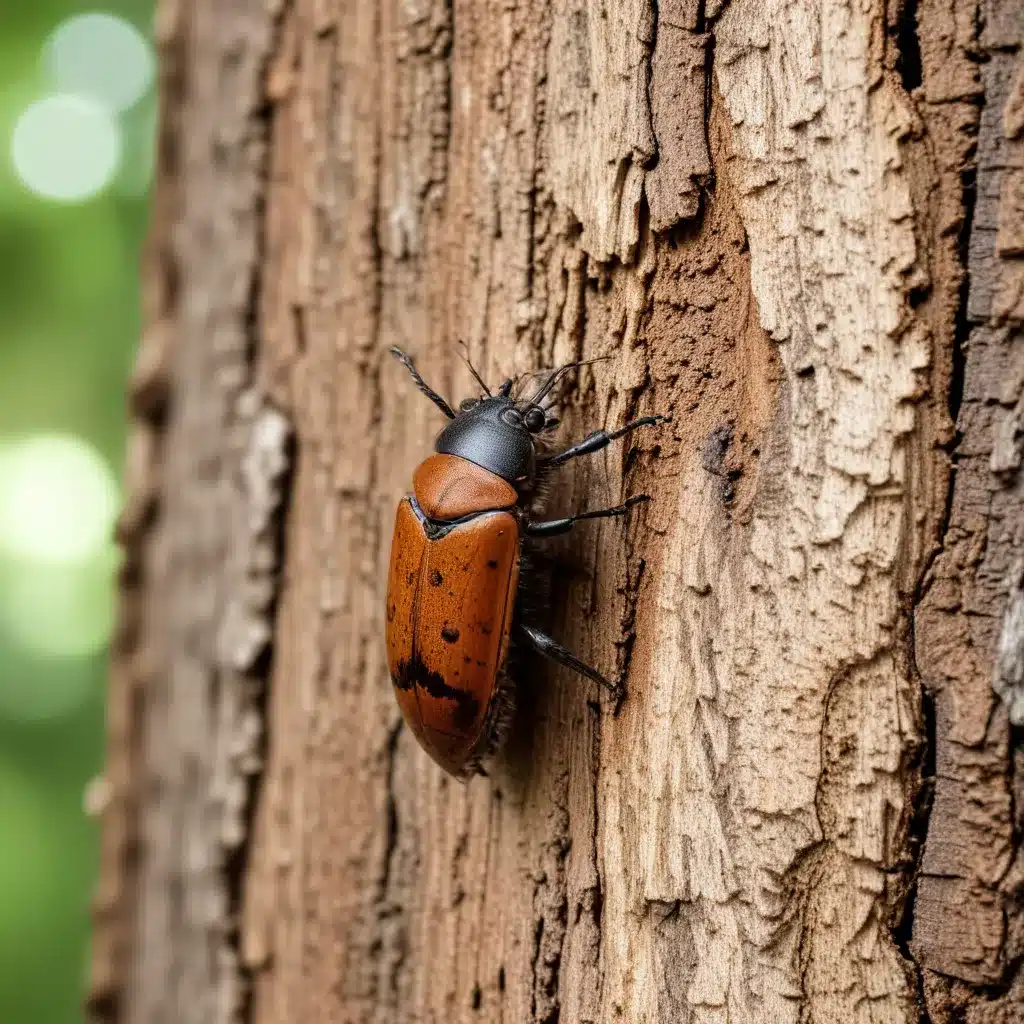
As a tree care specialist in South Florida, I’ve witnessed the devastating impact of bark beetles on our lush, subtropical landscapes. These pernicious pests pose a constant threat to the health and longevity of our beloved trees, and homeowners must be vigilant in their efforts to identify, monitor, and mitigate these invasive insects.
Pest Management Strategies
Bark beetles are small, wood-boring insects that tunnel into the bark of trees, disrupting the essential flow of nutrients and water. Their destruction can be swift and widespread, making early detection and proactive management crucial.
Identifying Bark Beetles
The first step in combating these destructive pests is to be able to recognize the signs of their presence. Look for pitch tubes – small, resin-filled structures on the tree’s trunk – as well as tiny entrance holes and the accumulation of sawdust-like frass at the base of the tree. Unhealthy, drought-stressed trees are particularly vulnerable to bark beetle infestations.
Monitoring for Infestations
Regularly inspecting your trees for signs of bark beetle activity is essential. Carefully examine the bark for any discoloration or dieback, and be on the lookout for the telltale signs mentioned earlier. Early detection can make all the difference in successfully managing an infestation.
Integrated Pest Control Techniques
When it comes to controlling bark beetles, a multifaceted approach is often the most effective. This may include pruning and removing severely infested trees to prevent the spread of the pests, as well as the judicious use of targeted insecticides applied by a licensed professional. Maintaining overall tree health through proper watering, fertilization, and canopy management can also help trees withstand and recover from bark beetle attacks.
Tree Health and Care
Ensuring the overall health and resilience of your trees is a crucial defense against bark beetle infestations. By addressing the underlying factors that can make trees more susceptible to these pests, you can bolster their natural defenses and reduce the risk of costly damage.
Soil Conditions and Nutrient Requirements
Providing your trees with the proper soil nutrients and conditions is essential for their overall vigor. Regular soil testing and the application of appropriate fertilizers can help ensure that your trees are getting the nourishment they need to thrive.
Watering and Irrigation Practices
Proper irrigation is another critical component of tree health. Drought-stressed trees are far more vulnerable to bark beetle attacks, so be sure to maintain consistent soil moisture levels, especially during the dry seasons.
Pruning and Canopy Management
Judicious pruning can also help reduce the risk of bark beetle infestations. Removing dead, dying, or weakened branches can improve air circulation and light penetration, making the tree less attractive to these pests.
Climate Resilience
As the climate in South Florida continues to evolve, it’s essential that we adapt our tree care practices to ensure the long-term health and sustainability of our urban forests.
Preparing for Tropical Storms
Hurricane preparedness is a crucial consideration for South Florida tree owners. Proper canopy management and the selection of storm-resistant tree species can help minimize the risk of damage during severe weather events.
Drought-Tolerant Tree Species
With the potential for increased drought conditions in the years to come, it’s important to choose drought-tolerant tree species that can better withstand periods of limited water availability. This will help ensure the long-term viability of your trees.
Adaptations to Local Climate
Staying informed about the latest horticultural research and recommendations for South Florida’s unique climate is essential. Seek guidance from local experts and resources, such as SouthFloridaTrees.com, to ensure that your tree care practices are well-suited to our subtropical environment.
Planting and Establishment
Proper tree selection and planting techniques can also play a significant role in the long-term health and resilience of your trees, helping to prevent and mitigate bark beetle infestations.
Selecting Appropriate Trees
When choosing trees for your South Florida landscape, consider factors such as mature size, pest and disease resistance, and adaptability to local conditions. Consulting with a certified arborist or horticulturist can help you make informed decisions.
Site Preparation and Planting Guidelines
Careful site preparation and planting techniques are essential for establishing a healthy root system and setting your trees up for success. This includes appropriate soil amendments, proper depth and orientation, and staking and mulching to support the tree during its establishment phase.
Establishing a Healthy Root System
A robust and well-developed root system is the foundation for a tree’s overall health and resilience. Ensuring that your trees receive the proper nutrients, water, and aeration during the critical establishment period can help them better withstand bark beetle attacks and other environmental stresses.
Ongoing Maintenance
Maintaining the long-term health and vitality of your trees is an ongoing process, and it’s essential to have a comprehensive plan in place to address pests, diseases, and other threats.
Fertilization and Nutrient Management
Regular fertilization and nutrient management can help sustain your trees’ vigor and resistance to bark beetles and other pests. Work with a qualified professional to determine the appropriate fertilizer type, application rate, and timing for your specific trees and growing conditions.
Pest and Disease Monitoring
Staying vigilant and proactively monitoring your trees for signs of pests and diseases, including bark beetles, is key to catching any issues before they become too severe. Prompt intervention can make all the difference in protecting your trees.
Long-term Care and Monitoring
Developing a comprehensive long-term care and monitoring plan for your trees is essential. This may include regular inspections, pruning, and other maintenance activities to ensure the continued health and resilience of your urban forest.
By implementing these comprehensive strategies for pest management, tree care, climate resilience, and ongoing maintenance, you can effectively protect your valuable trees from the destructive forces of bark beetles and ensure the long-term beauty and vitality of your South Florida landscape.


